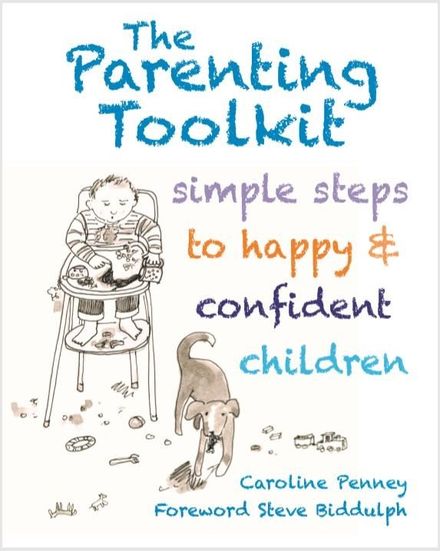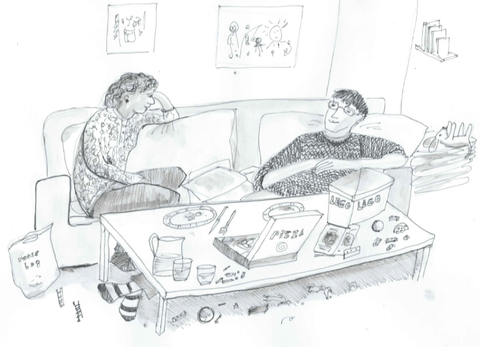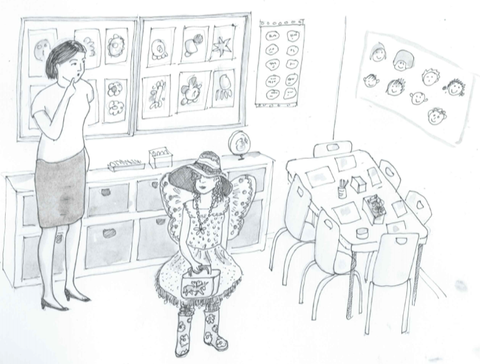Strategies from The Parenting Toolkit
This page gives you a complimentary flavour of Caroline's easy to read, practical approach to parenting.....

THE parenting manual everyone should have
Many parents tell me that they wish that had been given an instruction manual when they had a baby. Many of us felt completely unprepared for parenthood at first and had to ‘make it up as we go along.’ The Parents’ Toolkit is that manual we all wish we’d had.
The Parents’ Toolkit is based on how I have helped hundreds of families in my practice as a family therapist, on the latest research in the area, and on my own experience as the mother of three children. It is about becoming a reflective parent instead of just reacting to situations as they happen. It is about making the often-small changes in how you relate to your child, that can result in dramatic transformations in your family life.
The book is illustrated throughout with beautiful pictures by the painter, printer and illustrator Kate Hajducka.
Look after yourself
- Take time for yourself, eg a hot bath, watching football, seeing friends, whatever gives you joy
- Take up offers of help from family and friends
- Get together with other parents and children
- Look after your mental and physical health eg sleeping enough ( if possible ) good food, exercise
- Remember it’s fine to be good enough.

Acknowledging and expressing feelings
- If you acknowledge and accept feelings, then the child does not need to act them out and feels that they are understood. “Name the feeling to tame the feeling”
- They become aware of their own feelings and then can learn how to regulate them and they also develop empathy for other people.
- When we express our feelings, it is important to be calm and explain clearly what the problem is because the child might not know why you are upset.
- Using the statement below to express your feelings can be enormously helpful.
- When you …..
- I feel…….
- Because …….
- How can you help me with this?
Play
- Children learn through play.
- By playing children get to understand how to make relationships, how to share, stand up for themselves and negotiate. They discover the difference between fantasy and reality and are able to use play to manage difficult new experiences.
- If you can play for a short time every day with your child letting the take the led it helps to build up their bond with you
- Keep it simple, Have a small box of crayons toys and playdough handy
- Water or sand can keep a toddler or pre-school child busy for ages
- Imaginative games with dolls, animals, cars let their imagination run wild
- While they are playing they are less likely to be fighting their brother or sister or getting into trouble. If you set up an activity beforehand this could give you a bit of extra time to do your own jobs.
Descriptive praise
- Giving your child descriptive praise when they behave well can be like a magic wand for changing children’s behaviour to be more positive.
- Descriptive praise works by describing the behaviour specifically so the child knows exactly what is being praised. It also shows the child how much notice you are taking by commenting on the details.
Try to understand the reasons for your child's behaviour
- No behaviour happens without a reason and often there is a need that underlies that behaviour. By being a ‘detective’, you can often establish what that need is.
- Some of the needs children have are love, independence, security, exploration, boundaries, attention, a sense of belonging and to feel useful.
- By understanding the reason, you can often stop the behaviour happening by articulating it for the child.
- If your child keeps interrupting you when you are on the phone you could say: I know you want my attention but I just have to talk to auntie Mary now but afterwards we can sort out your school bag

Set boundaries
- Children are much happier with boundaries, They feel safer and more able to explore their world within those rules.
- It also links with routines because then children know what to expect
- It can be hard work but in the long run it helps both you and the children.
Communication
- Talking and listening to your child helps you get to know your child.
- You get to know what makes them happy, angry sad, anxious and excited and so upsetting situations can be avoided.
- Getting to the same level as your child makes it easier for them to talk to you. The more you can encourage your child to talk the less likely they will be to act out their frustration with poor behaviour. This is the reason that toddlers can be challenging because they are not yet able to express themselves.
- If you have to say ‘no’, explain the reason and you can then often offer an alternative. For example, no you cannot have another ice-cream, but you can have an apple.
- Your non-verbal communication can also be very important and so it is important to give whole attention and not be distracted.
